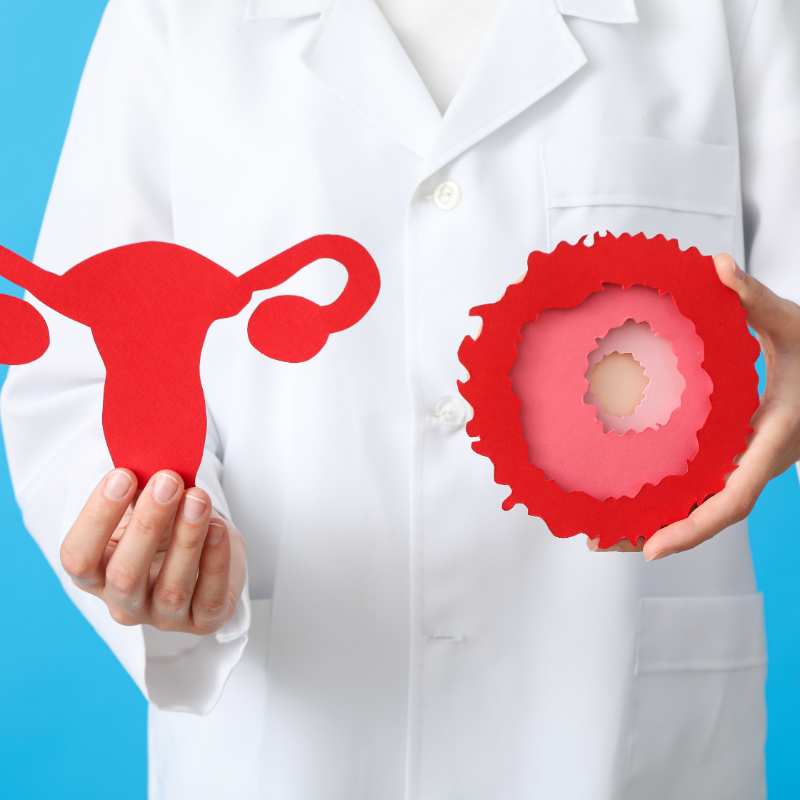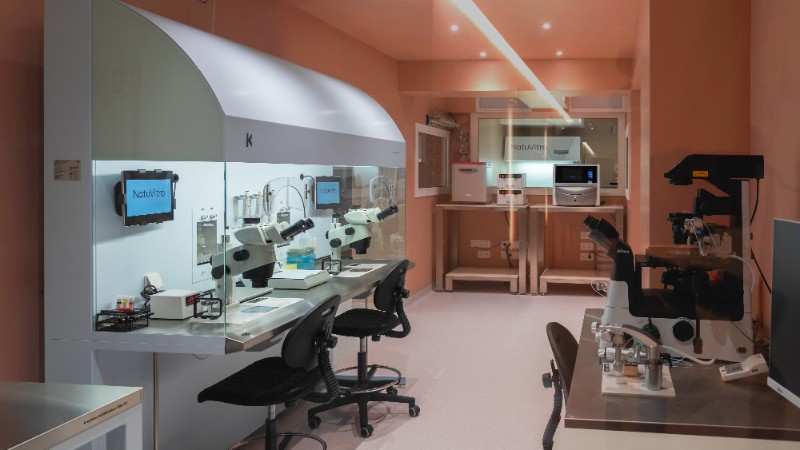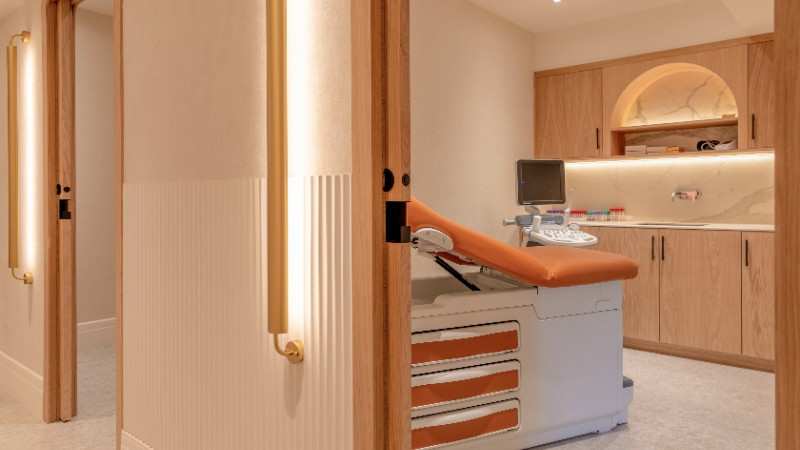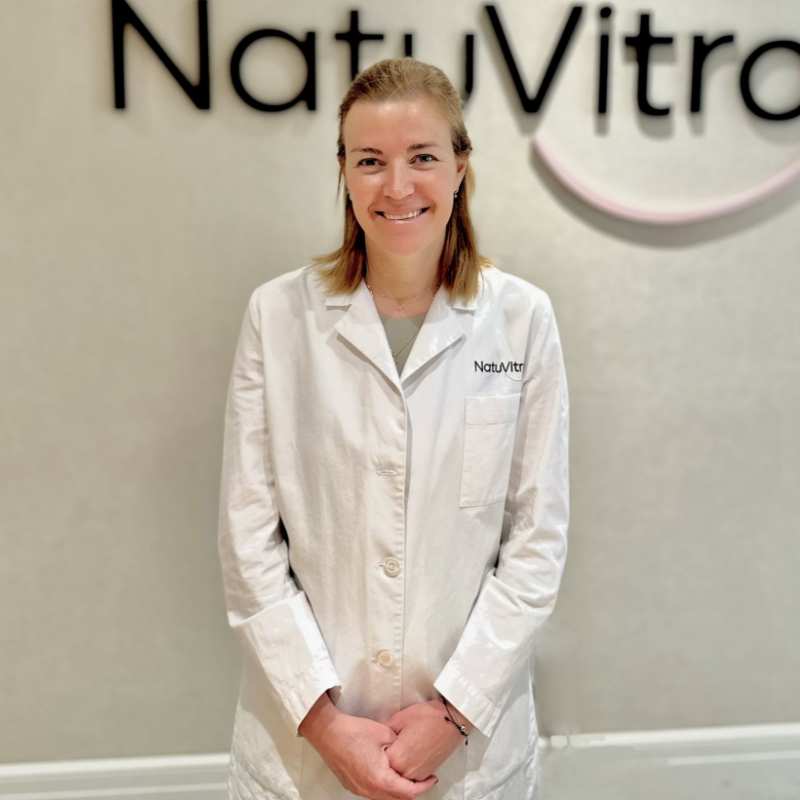
Premature ovarian insufficiency (POI) is a syndrome in which ovarian function is irreversibly lost in women under 40 years of age. It affects at least 1% of women and poses a serious barrier to the ability to conceive a child, which has negative impacts on women's health.
How to suspect the development of premature ovarian insufficiency?
Monitoring your menstrual cycle can help you suspect the development of premature ovarian insufficiency.
In particular:
- Primary amenorrhea (absence of periods throughout life);
- Secondary amenorrhea (menstruation has occurred but has stopped).
In the case of secondary amenorrhea, one may observe both a sudden cessation of periods and changes in the nature of the menstrual cycle (short intervals between periods, delays, light periods, up to a complete suspension). It is also possible that menstruation does not resume in this case (even after taking contraceptives).
Women may also complain of infertility, hot flashes, decreased libido, changes in skin condition - early signs of aging and dryness.
Is the absence of periods sufficient to confirm the diagnosis of premature ovarian insufficiency?
It should be noted that the symptoms of premature ovarian insufficiency can vary depending on the periodic production of sex hormones by the ovaries or the conversion of androgens into estrogens. What remains constant, however, is the weakness of the ovarian reserve. Most international guidelines currently advise that, to confirm premature ovarian insufficiency, the level of FSH (follicle-stimulating hormone) should be determined during days 2 to 4 of the menstrual cycle, twice at intervals of 4 to 6 weeks.
A value greater than 12-25 mIU/ml indicates ovarian insufficiency. A very important indicator of ovarian reserve is the level of AMH (anti-Müllerian hormone), which should be higher than 1.1 ng/ml in women under 40 years of age.
It is also advisable to examine the levels of estradiol, prolactin (PRL), thyroid-stimulating hormone (TSH), and free thyroxine (T4).
Causes of premature ovarian insufficiency
In many cases, the cause is unknown, but there is often a clear family history (early menopause in the mother, grandmother). In various studies, the prevalence of familial premature ovarian insufficiency ranges from 4 to 31%.
Multifactorial causes of premature ovarian insufficiency have been identified, but the main ones remain:
- Genetic causes
- Chromosomal abnormalities (abnormalities in the number of chromosomes, structural chromosomal rearrangements)
- Autoimmune diseases (most often AIT - autoimmune thyroiditis, rheumatoid arthritis)
- Iatrogenic factors (exposure to certain medications - cytostatics, chemotherapy), radiotherapy
- Surgical intervention on the ovaries
- Endometriosis, dermoid cysts of the ovaries
Genetic factors
More than 50 genes involved in the development of premature ovarian insufficiency have been identified (Qin Y, Jiao X, Simpson JL, Genetics of primary ovarian insufficiency: new developments and opportunities. Hum Reprod Update (2015) 21:787-8). Most of these genes are involved in folliculogenesis (the process of follicle maturation) and ovarian steroidogenesis (production of sex hormones). The progression of premature ovarian insufficiency is evaluated based on the genes or combinations of genes involved.
Premature ovarian insufficiency may also be associated with X-linked chromosomal abnormalities, such as Turner syndrome and a fragile X chromosome.
Autoimmune factors
The incidence of autoimmune diseases is higher in women with premature ovarian insufficiency than in women in the general population.
The most common autoimmune disorders associated with premature ovarian insufficiency are hypothyroidism and hyperparathyroidism. Type 1 diabetes, celiac disease, myasthenia gravis, rheumatoid arthritis, alopecia, and multiple sclerosis are less common.
Iatrogenic exposure
It is increasingly common to find women who have had cancer and have been treated with chemotherapy or radiotherapy. The exposure depends on the type of therapy, dosage, age at the time of treatment, and ovarian reserve. Additionally, any surgical intervention on the ovaries can contribute to the development of premature ovarian insufficiency.
How does premature ovarian insufficiency affect a woman's health and life?
The main symptoms that appear in the case of premature decline in ovarian reserve are due to hypoestrogenism, hypoprogestinism, and hypoandrogenism.
The first typical symptoms include: hot flashes, increased sweating, tendency to gain weight, anxiety, mood swings, depression, sleep disturbances, decreased libido, dryness of mucous membranes, loss of concentration, and decreased ability to remember information.
The late complications of these untreated symptoms are: cardiovascular diseases, increased cholesterol levels, insulin resistance (which can lead to the development of type II diabetes), osteoporosis, depression, Alzheimer's disease, and Parkinson's disease. A woman's quality of life also deteriorates significantly.
The risk of coronary artery disease is 48% higher in women with premature ovarian insufficiency than in women whose menstrual cycle ended around the age of 50-51.
A study conducted by Bove and colleagues found a decrease in cognitive functions and an increase in the incidence of Alzheimer's disease in women who underwent surgery at a young age. This surgery resulted in an estrogen deficiency in the body.
How to remedy the premature decline of estrogen in women?
The latest scientific evidence and recommendations on the subject of premature ovarian insufficiency emphasize the importance of a healthy lifestyle, balanced nutrition, physical activity, adequate sleep, and quitting smoking.
However, the most important element in the treatment and prevention of late complications of premature ovarian insufficiency is the prescription of hormone replacement therapy (HRT), which should be chosen individually, taking into account age, the cause of hypoestrogenism, and comorbidities.
There are currently effective means that allow a woman to live, work, and fully enjoy life.
When premature ovarian insufficiency is diagnosed, women often face issues with natural conception. In this case, assisted reproductive techniques come to the rescue.
The main methods used are as follows:
In vitro fertilization (IVF) is a process in which a woman's egg is fertilized by sperm in a laboratory, after which the embryo is transferred to the uterine cavity. IVF is one of the main treatments for infertility caused by various factors, including premature ovarian insufficiency.
IVF with egg donation - when a woman cannot use her own eggs due to low ovarian reserve or lack of eggs, egg donation is an alternative. The eggs from a donor are fertilized with sperm from the partner or a donor, and the embryo is then transferred to the woman's uterus.
Our experts are ready to examine your case history, clarify your choices, and address every question you have.
Don't wait to make informed decisions – your personalized guidance awaits!
- Spain (España)+34
- France (La France)+33
- Italy (Italia)+39
- United Kingdom+44
- United States+1
- Belgium (België)+32
- Switzerland (Schweiz/Suisse)+41
- Germany (Deutschland)+49
- Netherlands (Nederland)+31
- Afghanistan (افغانستان)+93
- Albania (Shqipëri)+355
- Algeria (الجزائر)+213
- American Samoa+1
- Andorra+376
- Angola+244
- Anguilla+1
- Antigua and Barbuda+1
- Argentina+54
- Armenia (Հայաստան)+374
- Aruba+297
- Ascension Island+247
- Australia+61
- Austria (Österreich)+43
- Azerbaijan (Azərbaycan)+994
- Bahamas+1
- Bahrain (البحرين)+973
- Bangladesh (বাংলাদেশ)+880
- Barbados+1
- Belarus (Беларусь)+375
- Belize+501
- Benin (Bénin)+229
- Bermuda+1
- Bhutan (འབྲུག)+975
- Bolivia+591
- Bosnia and Herzegovina (Босна и Херцеговина)+387
- Botswana+267
- Brazil (Brasil)+55
- British Indian Ocean Territory+246
- British Virgin Islands+1
- Brunei+673
- Bulgaria (България)+359
- Burkina Faso+226
- Burundi (Uburundi)+257
- Cambodia (កម្ពុជា)+855
- Cameroon (Cameroun)+237
- Canada+1
- Cape Verde (Kabu Verdi)+238
- Caribbean Netherlands+599
- Cayman Islands+1
- Central African Republic (République centrafricaine)+236
- Chad (Tchad)+235
- Chile+56
- China (中国)+86
- Christmas Island+61
- Cocos (Keeling) Islands+61
- Colombia+57
- Comoros (جزر القمر)+269
- Congo (DRC) (Jamhuri ya Kidemokrasia ya Kongo)+243
- Congo (Republic) (Congo-Brazzaville)+242
- Cook Islands+682
- Costa Rica+506
- Côte d’Ivoire+225
- Croatia (Hrvatska)+385
- Cuba+53
- Curaçao+599
- Cyprus (Κύπρος)+357
- Czech Republic (Česká republika)+420
- Denmark (Danmark)+45
- Djibouti+253
- Dominica+1
- Dominican Republic (República Dominicana)+1
- Ecuador+593
- Egypt (مصر)+20
- El Salvador+503
- Equatorial Guinea (Guinea Ecuatorial)+240
- Eritrea+291
- Estonia (Eesti)+372
- Eswatini+268
- Ethiopia+251
- Falkland Islands (Islas Malvinas)+500
- Faroe Islands (Føroyar)+298
- Fiji+679
- Finland (Suomi)+358
- French Guiana (Guyane française)+594
- French Polynesia (Polynésie française)+689
- Gabon+241
- Gambia+220
- Georgia (საქართველო)+995
- Ghana (Gaana)+233
- Gibraltar+350
- Greece (Ελλάδα)+30
- Greenland (Kalaallit Nunaat)+299
- Grenada+1
- Guadeloupe+590
- Guam+1
- Guatemala+502
- Guernsey+44
- Guinea (Guinée)+224
- Guinea-Bissau (Guiné Bissau)+245
- Guyana+592
- Haiti+509
- Honduras+504
- Hong Kong (香港)+852
- Hungary (Magyarország)+36
- Iceland (Ísland)+354
- India (भारत)+91
- Indonesia+62
- Iran (ایران)+98
- Iraq (العراق)+964
- Ireland+353
- Isle of Man+44
- Israel (ישראל)+972
- Italy (Italia)+39
- Jamaica+1
- Japan (日本)+81
- Jersey+44
- Jordan (الأردن)+962
- Kazakhstan (Казахстан)+7
- Kenya+254
- Kiribati+686
- Kosovo+383
- Kuwait (الكويت)+965
- Kyrgyzstan (Кыргызстан)+996
- Laos (ລາວ)+856
- Latvia (Latvija)+371
- Lebanon (لبنان)+961
- Lesotho+266
- Liberia+231
- Libya (ليبيا)+218
- Liechtenstein+423
- Lithuania (Lietuva)+370
- Luxembourg+352
- Macau (澳門)+853
- North Macedonia (Македонија)+389
- Madagascar (Madagasikara)+261
- Malawi+265
- Malaysia+60
- Maldives+960
- Mali+223
- Malta+356
- Marshall Islands+692
- Martinique+596
- Mauritania (موريتانيا)+222
- Mauritius (Moris)+230
- Mayotte+262
- Mexico (México)+52
- Micronesia+691
- Moldova (Republica Moldova)+373
- Monaco+377
- Mongolia (Монгол)+976
- Montenegro (Crna Gora)+382
- Montserrat+1
- Morocco (المغرب)+212
- Mozambique (Moçambique)+258
- Myanmar (Burma) (မြန်မာ)+95
- Namibia (Namibië)+264
- Nauru+674
- Nepal (नेपाल)+977
- New Caledonia (Nouvelle-Calédonie)+687
- New Zealand+64
- Nicaragua+505
- Niger (Nijar)+227
- Nigeria+234
- Niue+683
- Norfolk Island+672
- North Korea (조선 민주주의 인민 공화국)+850
- Northern Mariana Islands+1
- Norway (Norge)+47
- Oman (عُمان)+968
- Pakistan (پاکستان)+92
- Palau+680
- Palestine (فلسطين)+970
- Panama (Panamá)+507
- Papua New Guinea+675
- Paraguay+595
- Peru (Perú)+51
- Philippines+63
- Poland (Polska)+48
- Portugal+351
- Puerto Rico+1
- Qatar (قطر)+974
- Réunion (La Réunion)+262
- Romania (România)+40
- Russia (Россия)+7
- Rwanda+250
- Saint Barthélemy+590
- Saint Helena+290
- Saint Kitts and Nevis+1
- Saint Lucia+1
- Saint Martin (Saint-Martin (partie française))+590
- Saint Pierre and Miquelon (Saint-Pierre-et-Miquelon)+508
- Saint Vincent and the Grenadines+1
- Samoa+685
- San Marino+378
- São Tomé and Príncipe (São Tomé e Príncipe)+239
- Saudi Arabia (المملكة العربية السعودية)+966
- Senegal (Sénégal)+221
- Serbia (Србија)+381
- Seychelles+248
- Sierra Leone+232
- Singapore+65
- Sint Maarten+1
- Slovakia (Slovensko)+421
- Slovenia (Slovenija)+386
- Solomon Islands+677
- Somalia (Soomaaliya)+252
- South Africa+27
- South Korea (대한민국)+82
- South Sudan (جنوب السودان)+211
- Spain (España)+34
- Sri Lanka (ශ්රී ලංකාව)+94
- Sudan (السودان)+249
- Suriname+597
- Svalbard and Jan Mayen+47
- Sweden (Sverige)+46
- Syria (سوريا)+963
- Taiwan (台灣)+886
- Tajikistan+992
- Tanzania+255
- Thailand (ไทย)+66
- Timor-Leste+670
- Togo+228
- Tokelau+690
- Tonga+676
- Trinidad and Tobago+1
- Tunisia (تونس)+216
- Turkey (Türkiye)+90
- Turkmenistan+993
- Turks and Caicos Islands+1
- Tuvalu+688
- U.S. Virgin Islands+1
- Uganda+256
- Ukraine (Україна)+380
- United Arab Emirates (الإمارات العربية المتحدة)+971
- Uruguay+598
- Uzbekistan (Oʻzbekiston)+998
- Vanuatu+678
- Vatican City (Città del Vaticano)+39
- Venezuela+58
- Vietnam (Việt Nam)+84
- Wallis and Futuna (Wallis-et-Futuna)+681
- Western Sahara (الصحراء الغربية)+212
- Yemen (اليمن)+967
- Zambia+260
- Zimbabwe+263
- Åland Islands+358
Visit our clinic
Location
Call us now
Leave a message







